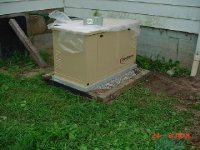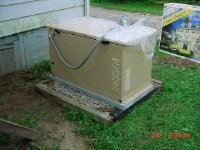F350Lawman
Gold Member
Yes, your right it is 13kw on LP without the kit maybe the 12kw figure was for NG.
My friend was a supervisor for the local utility company so he will get to do his install and mine( I'll assist). In exchange I go get the generators with my F350 and move em' around with the tractor. /forums/images/graemlins/grin.gif
The upgrade kit is free and includes shipping so I would get it anyway and see if it's an easy install. I f so I'd throw it on, otherwise keep it for when/if your power needs grow.
My friend was a supervisor for the local utility company so he will get to do his install and mine( I'll assist). In exchange I go get the generators with my F350 and move em' around with the tractor. /forums/images/graemlins/grin.gif
The upgrade kit is free and includes shipping so I would get it anyway and see if it's an easy install. I f so I'd throw it on, otherwise keep it for when/if your power needs grow.



